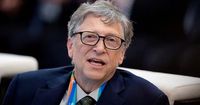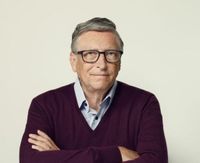On May 9, 2025, billionaire philanthropist Bill Gates escalated his ongoing feud with Tesla and SpaceX CEO Elon Musk, accusing him of jeopardizing the lives of the world’s most vulnerable children due to severe cuts to U.S. foreign assistance. Gates made these allegations in an interview with the Financial Times and reiterated them in a separate conversation with The New York Times, where he described Musk’s actions as tantamount to ‘killing the world’s poorest children.’
Gates specifically pointed to Musk’s decision to halt funding for a hospital in Gaza Province, Mozambique, which was instrumental in preventing mother-to-child transmission of HIV. “The picture of the world’s richest man killing the world’s poorest children is not a pretty one,” Gates stated. He lamented the consequences of these cuts, suggesting that innocent lives are at stake and that Musk should meet the children who have been infected with HIV as a direct result of his funding decisions.
Musk’s Department of Government Efficiency (Doge) effectively shuttered the operations of the U.S. Agency for International Development (USAID) in February 2025, citing a need for its closure. This agency has traditionally been a major channel for U.S. aid distribution worldwide. Gates expressed grave concerns about the ramifications of such abrupt cuts, warning that essential supplies like food and medicines could go to waste in storage facilities, potentially leading to the resurgence of diseases like measles, HIV, and polio.
“He’s the one who cut the USAID budget,” Gates told The New York Times. “He put it in the wood chipper, because he didn’t go to a party that weekend.” Gates criticized Musk’s lack of understanding regarding the global implications of his decisions, calling those involved in the cuts “geographically illiterate.”
In light of these controversies, Gates is unveiling a strategy to significantly increase his philanthropic spending over the next two decades. He announced plans to allocate over $200 billion towards global health, development, and education, effectively doubling the amount his foundation has spent since its inception in 2000. Gates intends to dissolve the Gates Foundation by 2045, emphasizing a concentrated effort to maximize impact during this period.
As Gates prepares to pass on less than 1% of his wealth to his children, he has also advocated for a robust estate tax system to counter the accumulation of “dynastic wealth.” He supports implementing more progressive taxation policies, aiming to ensure that wealth is distributed more equitably.
Despite the philanthropic ambitions of Gates, he cautioned that private philanthropy alone cannot fill the void left by the cuts to USAID, which had a budget of $44 billion last year. This stark reality highlights the challenges faced by global health initiatives in the wake of reduced government spending.
Gates’ criticisms of Musk come amid a backdrop of previous clashes between the two billionaires. Musk has labeled Gates as “categorically insane” in the past, particularly during a dispute over Gates shorting Tesla stock. In September 2020, Musk remarked that Gates “has no clue” regarding the viability of electric trucks, and the two have exchanged barbs over various issues, including vaccine distribution during the COVID-19 pandemic.
In his latest remarks, Gates urged Musk to reconsider his decisions and the broader impact they have on global health and development. “I’d love for him to go in and meet the children that have now been infected with HIV because he cut that money,” Gates lamented.
As the feud between these two titans of industry continues, it raises important questions about the responsibilities of billionaires in addressing global challenges. Gates, with his extensive philanthropic history, contrasts sharply with Musk’s recent policy shifts that have sparked outrage among advocates for international aid.
Gates’ commitment to philanthropy is clear, as he aims to leave behind a legacy of impactful giving. He stated, “The world’s richest man has been involved in the deaths of the world’s poorest children,” underscoring the severity of his accusations against Musk.
With the Gates Foundation poised to dramatically increase its spending on global health initiatives, there is hope that significant progress can be made in areas such as eradicating diseases like polio and finding a cure for HIV. However, the effectiveness of these efforts may be undermined if government funding continues to dwindle, leaving vulnerable populations at risk.
As this high-profile conflict unfolds, it serves as a reminder of the complex interplay between wealth, responsibility, and global health. Gates’ warnings about the implications of Musk’s funding cuts resonate deeply within the philanthropic community, drawing attention to the urgent need for continued support for international aid efforts.
In a world where the actions of billionaires can have far-reaching consequences, the stakes have never been higher. With Gates’ ambitious philanthropic plans and Musk’s controversial budgetary decisions, the future of global health hangs in the balance.


